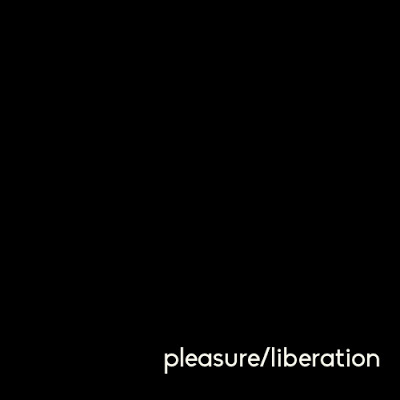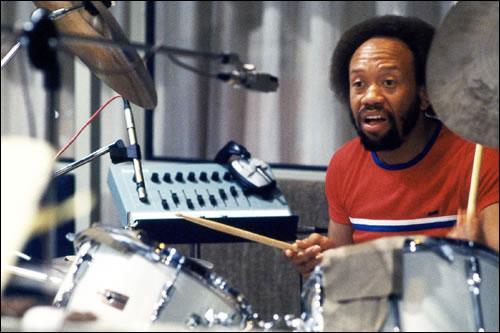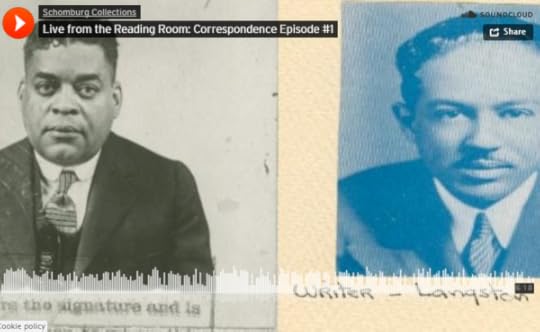Mark Anthony Neal's Blog, page 643
February 14, 2016
Pleasure/Liberation: A Mixtape Experience Curated by Kwame Phillips + Shana Redmond + Mark Anthony Neal
 pleasure/liberation
text by Shana Redmond + Mark Anthony Nealmix by Kwame Phillips
pleasure/liberation
text by Shana Redmond + Mark Anthony Nealmix by Kwame Phillips What’s to matter, if no love? What’s to Liberate if no Love?
I’ve always been struck by the fact that the last moments of Fred Hampton’s life were likely spent in the embrace of his lover. We don’t talk about that much--like lovers are a distraction--but what is liberation but the chance to see the sunlight in their eyes, off their cheeks, on back bare, and soft, and softer by the light? “If I should die tonight?” Marvin asked, Mama Gun’s gun responding as so many did before her, and even before Marvin asked the question--“rich as the night, Afro-Blue”? Nikki G, stating frankly, “if I was a poet...I’d kidnap you” or would that be liberate you?-- “last night a DJ saved my life…”
To take Black love seriously, one must suspend what we’re told of Black life in favor of what we know to be true--those other dimensions of Black living illegible to news media and politicians. Roberta and Donny make it clear that “our time, short and precious” is nonetheless staked with urgent claims and love, for “if I lose you I’d be ruined forever.” The tragedy is that Mike Brown, Aiyana Stanley-Jones and Tamir Rice, perhaps never knew that liberation, though the warm embraces of a parent were the revolutionary acts that were as normal as our expectation of sudden, inexplicable, though absolutely explainable, death, at the hand of forces known and unknown, knowable and unknowable, perhaps like liberation, if liberation was something that we didn’t/don’t imagine and conjure in the smallness of the moment; in the quiet of the times.
Never be enough of that quiet now; the voices in our head now three-fold because of platforms social, intended connection that only brings the noise, and it ain’t like we don’t know noise; have created brilliance amongst the noise--plug that shit in Muddy; plug that shit in DJ; plug this shit in…
Times demand a new way to hear.
This then is an ode to Black love--to the grooves that it digs and spins, to the challenges and pleasures it produces, to the melodies and other sounds that it inspires. As our Fantastic brother Richard Iton argued, the black love song “can be seen as one of the more familiar and available sites for the imagination of black political possibilities, radical and otherwise” (2013, 26). Black love is our “mission… Moses and Mumia, reparations…”; it’s “free hips--they don’t like to be held back… they go where they want to go and they do what they want to do”; it “perhaps is only felt by people on the same side of the barricades, listening to the accumulating thunder of the hooves of horses and the tread of tanks.”
That analog liberation mix don’t compute in the digital realm; that digital resistance drops and gaps and sputters in the analog; having a long conversation with That part my brain, with a lover of ideas perhaps, about playback errors, the Black ones.
There is liberation in the messiness of it all, like a digital analog that don’t quite do, but don’t quite don’t and it is as it’s ever been: us, nearly all of us, scoping the quiet in the moment, afterthoughts as well as afterplay, cause it’s really that that we live with, in strife and struggle, and in the pursuit, now as much as then, as much as forever...of that liberation.
Published on February 14, 2016 12:08
Love and Criticism for Beyoncé's "Formation"-- A Conversation with Yaba Blay + Shantrelle Lewis
 Walker Evans--"Girl in French Quarter" (1935)Yaba Blay + Shantrelle Lewis join
#StrangeFruit
hosts Kaila Story and Jaison Gardner in a conversation about Beyonce's "Formation" and NOLA culture. As Professor Blay notes, "The history of New Orleans is a history of colorism," she explains. "It is a history of oppression based not just on skin color, but on gradation of skin color."
Walker Evans--"Girl in French Quarter" (1935)Yaba Blay + Shantrelle Lewis join
#StrangeFruit
hosts Kaila Story and Jaison Gardner in a conversation about Beyonce's "Formation" and NOLA culture. As Professor Blay notes, "The history of New Orleans is a history of colorism," she explains. "It is a history of oppression based not just on skin color, but on gradation of skin color."
Published on February 14, 2016 10:16
February 13, 2016
The Earth, Wind, and Fire...This Time: In Appreciation of Maurice White by Law Ware
 The Earth, Wind, and Fire...This Time: In Appreciation of Maurice Whiteby Law Ware | @Law_Ware | NewBlackMan (in Exile)
The Earth, Wind, and Fire...This Time: In Appreciation of Maurice Whiteby Law Ware | @Law_Ware | NewBlackMan (in Exile)To fully appreciate the work of Earth, Wind & Fire founder Maurice White, we must understand the historical context that influenced his work. Earth, Wind and Fire became household names at a time of national strife. After the assassination of Martin Luther King, Jr. in April of 1968, Chicago, Maurice White’s hometown, erupted into chaos. The 1968 Chicago Riots are still remembered as 48 hours of unmitigated violence both at the hands of the rioters and the police. Riots erupted again in August of the same year when the Democratic National Convention came to town.
It was a time of civil unrest and black consciousness. Those who perpetually experienced the underside of the American democratic experiment organized and pushed back against political white supremacy and white normativity. Slogans like fight the power and black is beautiful could be heard over the airways while black men and women pushed aesthetic boundaries in how they dressed and styled their hair.
It was a revolutionary time, and, as always, music reflected what was happening in the streets. The Last Poets declared that Niggers are Scared of Revolution. Gil Scott-Heron said it was Winter in America. Marvin Gaye asked What’s Going on? And the Chi-lites demanded (For God's Sake) Give More Power to the People. These songs are grounded in the lived experience of black and brown people suffering under oppression. They are political statements.
This is the milieu that influenced the late Maurice White. Earth Wind and Fire gave voice to these concerns, but part of White’s genius was that they did so in deceptively innovative ways.
By focusing on themes of love and community, EWF combated the psychological violence visited upon black America by affirming the uniqueness of our sound and culture. Theirs was a music that celebrated black brilliance.
Songs like Shining Star and Sing a Song communicated the truth that no matter your circumstances, no matter the psychic violence you endure, you are beautiful, you are validated—and there is hope. Let’s Groove and Boogie Wonderland are a celebration of black beauty and an affirmation of black joy. Can’t Hide Love and After the Love is Gone make room for black romantic expression in all its complexity and splendor. White unapologetically centered blackness, and we are all the better for it.
The unique nature of White’s sonic experimentation continues to influence black musicianship today—notably, and perhaps unexpectedly, this influence is deeply felt in hip-hop.
EWF’s work has been heavily sampled. Jay-Z’s ubiquitous 1999 hit Nigga What, Nigga Who samples the electric guitar from Earth Wind, and Fire’s Sunshine. Big Pun and Joe’s Still not a Player borrows the melody, piano and percussion of the effervescent Brazilian Rhyme; and the Fugee’s underground hit Nappy Heads borrows melodically from the classic ballad I Think About Loving You. Artists as diverse as Piles, O.S.T.R. and Three 6 Mafia have sampled the brilliant Fantasy. And the experimentation of placing orchestration with heavy percussion and electric bass is still present in the work of artists like Kanye West, Dr. Dre, and Timbaland.
Maurice White’s music pushed back against the tendency of marginalized people to be defined by their oppression. He refused to allow pain to have the final word. He was innovative and influential in the use of sound and percussion, but his greatest legacy is in the decision to affirm and celebrate the fullness of the black experience.
Thank you, Maurice White, for the beauty and witness you brought to the world. Rest with the ancestors.
+++
Lawrence Ware is an Oklahoma State University Division of Institutional Diversity Fellow. He teaches in OSU's philosophy department and is the Diversity Coordinator for its Ethics Center. A frequent contributor to the publication The Democratic Left and contributing editor of the progressive publication RS: The Religious Left, he has also been a commentator on race and politics for the Huffington Post Live, NPR's Talk of the Nation, and PRI’s Flashpoint. Follow him on Twitter: @law_ware
Published on February 13, 2016 20:31
February 12, 2016
Live from the Reading Room: Arturo Schomburg to Langston Hughes
 'This podcast features a letter between two leading 20th century figures: bibliophile/collector/activist Arturo Schomburg (founder of the Schomburg Center) and poet/activist/playwright/author Langston Hughes. In the letter, read aloud by read aloud by Steven Fullwood (Curator of the Schomburg's Manuscripts, Archives and Rare Books Division), Schomburg writes to Hughes regarding collection acquisitions collected during his travels throughout the African Diaspora and Russia.'
'This podcast features a letter between two leading 20th century figures: bibliophile/collector/activist Arturo Schomburg (founder of the Schomburg Center) and poet/activist/playwright/author Langston Hughes. In the letter, read aloud by read aloud by Steven Fullwood (Curator of the Schomburg's Manuscripts, Archives and Rare Books Division), Schomburg writes to Hughes regarding collection acquisitions collected during his travels throughout the African Diaspora and Russia.'
Published on February 12, 2016 19:00
Self-Care is a Radical Act—Especially for Black Women: Interview with Evette Dionne
 Photo Credit: Jamaica Gilmer'Audre Lorde said self-care was an "act of political warfare." In this interview with +Bitch Media writer
Evette Dionne
discusses why self-care is still a radical practice for Black women.'
Photo Credit: Jamaica Gilmer'Audre Lorde said self-care was an "act of political warfare." In this interview with +Bitch Media writer
Evette Dionne
discusses why self-care is still a radical practice for Black women.'
Published on February 12, 2016 18:53
Environmental Racism and the Future of Urban Social Movements: Katrina After 10
 '"Katrina After Ten” brought together activists, artists, and intellectuals to discuss critical issues such as environmental racism, gender discrimination, gentrification, mass incarceration, education and privatization; as well as the history and future of social movements in New Orleans. The Environmental Racism and the Future of Urban Social Movements” Panels featured: Joshua B. Guild, Associate Professor of History and African American Studies, Princeton University • Malik Rahim, Cofounder of Common Ground Collective • Cindi Katz, Professor of Geography, Environmental Psychology, Women's Studies, and American Studies, and Chair of the Earth and Environmental Sciences Program, CUNY Graduate Center'.
'"Katrina After Ten” brought together activists, artists, and intellectuals to discuss critical issues such as environmental racism, gender discrimination, gentrification, mass incarceration, education and privatization; as well as the history and future of social movements in New Orleans. The Environmental Racism and the Future of Urban Social Movements” Panels featured: Joshua B. Guild, Associate Professor of History and African American Studies, Princeton University • Malik Rahim, Cofounder of Common Ground Collective • Cindi Katz, Professor of Geography, Environmental Psychology, Women's Studies, and American Studies, and Chair of the Earth and Environmental Sciences Program, CUNY Graduate Center'.
Published on February 12, 2016 18:45
How the Internet Destroyed Millennia of Knowledge
 'When Copernicus put the sun at the center of the solar system in 1543 instead of the Earth, it dealt a major blow to the self-esteem of people who needed to be at the center of it all. Andrew Keen argues, in his book The Internet is Not the Answer, that "in terms of progress that we’ve gone back to a pre-Copernican understanding of the universe where everything revolves around us."-- +Big Think
'When Copernicus put the sun at the center of the solar system in 1543 instead of the Earth, it dealt a major blow to the self-esteem of people who needed to be at the center of it all. Andrew Keen argues, in his book The Internet is Not the Answer, that "in terms of progress that we’ve gone back to a pre-Copernican understanding of the universe where everything revolves around us."-- +Big Think
Published on February 12, 2016 18:38
The Movement: If All You Know About Baltimore is ‘The Wire’...
 "If all you know is
The Wire
' and if all you know is the riots and what people say…you don’t know my Baltimore"--Many assumed that the death of Freddie Gray and the resulting chaos would tear the city of Baltimore apart — meet the young people of
The Inner Harbor Project
taking the lead and working with police to repair the wounds.' --
.Mic
"If all you know is
The Wire
' and if all you know is the riots and what people say…you don’t know my Baltimore"--Many assumed that the death of Freddie Gray and the resulting chaos would tear the city of Baltimore apart — meet the young people of
The Inner Harbor Project
taking the lead and working with police to repair the wounds.' --
.Mic
Published on February 12, 2016 18:21
On Set: Hip-Hop + R&B’s New Voices Riff on Roberta Flack's "Killing Me Softly"
 Gathered for a T Magazine photo shoot, seven of R&B's rising stars--Lord Narf + Abra + Dej Loaf + Empress Of + Jean Deaux + SZA + Tinashe--take on a 1970s Soul classic.
Gathered for a T Magazine photo shoot, seven of R&B's rising stars--Lord Narf + Abra + Dej Loaf + Empress Of + Jean Deaux + SZA + Tinashe--take on a 1970s Soul classic.
Published on February 12, 2016 18:12
The Way of the World: A Tribute to Maurice White by Emily J. Lordi
 The Way of the World: A Tribute to Maurice Whiteby Emily J. Lordi | @EJLordi | NewBlackMan (in Exile)
The Way of the World: A Tribute to Maurice Whiteby Emily J. Lordi | @EJLordi | NewBlackMan (in Exile)The summer I finished writing a book was the summer I quit smoking. People who have been, or are now, both smokers and writers will know what bad timing this was: how over the years a smoke break can come to seem like the whole point of disciplined work. To be writing intensively with no such reward in sight—not in an hour, not at the end of the day, not… ever? I felt unmoored. I sought to break old rhythms and forge new ones by moving temporarily to New York and listening constantly to Earth, Wind & Fire.
That summer Wax Poetics ran a cover story about the band in which Ericka Blount Danois described Maurice White’s “clean-cut lifestyle”—a philosophy that included “healthy living, vegetarianism, spirituality, astrology, and Egyptology.” Far from the body-shaming, death-denying capitalistic cult of good health, here was a fundamentally political insistence on black well-being, a way of linking physical self-care with spiritual and creative renewal.
Maurice himself told Rolling Stone that EWF’s music aimed to offer black people “greater freedom from restrictions we had placed on ourselves in terms of our individual potential.” It often worked: fans credited the group with helping them quit heroin, start over.
According to singer Phillip Bailey, “Our mission was to tell people, ‘Hey, you’re naturally high, and you can maintain that natural high by discovering who you are—by opening your third eye.’ We weren’t just saying it, we were living it.” In a decade of anti-black “benign neglect,” the group modeled collective ascendance—the paradox of clean living in the service of the funk.
The group’s gift to American pop was to make manifest—and deliciously imminent—the sound of such transformation. Take, for instance, their 1975 hit “That’s the Way of the World.” Composed by Maurice and Verdine White and master arranger Charles Stepney, the song begins unhurriedly: mellow keyboard intro, rising trumpet line, steady backbeat. Maurice White and Phillip Bailey’s layered falsettos enter in time: Hearts of fire creates love desire / Take you high and higher to the world you belong.
In the first of many expansions, the words burst like tiny sparklers: fiyah, desiyah, take you hiyah. The song is sung from a “we” to a “you” that needs encouraging—we come together on this special day to sing our message loud and clear… Stay young at heart, cause you’re never, never old—and it doesn’t so much progress as it blossoms. Not only do White and Bailey’s vocal lines yield new colors and complexities but, as Nate Chinen notes, bassist Verdine gradually “starts anticipating the changes, leaning on the passing tones.” So the song owes its subtle pull (come along to the world where you belong) to even subtler collaborations.
Slowly, the titular “world” starts to turn, from a cold, hard place into a shrine. Hearts of fiyah, love desiyah, higher hiyah. The space widens as Bailey’s ethereal vocals ascend while White’s gritty sound rounds out the bottom. White’s earthy, funky adlibs solidify the world whose way the group is lighting and model the process of making it up as you go along, with a whole band of outsiders to help you. You can climb inside and ride the music for as long as it takes to get someplace better.
Godspeed, Maurice White, who led the way and beat us to it.
+++
Emily J. Lordi is the author of Black Resonance: Iconic Women Singers and African American Literature and a forthcoming book on the album Donny Hathaway Live. She is an assistant professor of English at the University of Massachusetts, Amherst.
Published on February 12, 2016 07:32
Mark Anthony Neal's Blog
- Mark Anthony Neal's profile
- 30 followers
Mark Anthony Neal isn't a Goodreads Author
(yet),
but they
do have a blog,
so here are some recent posts imported from
their feed.



